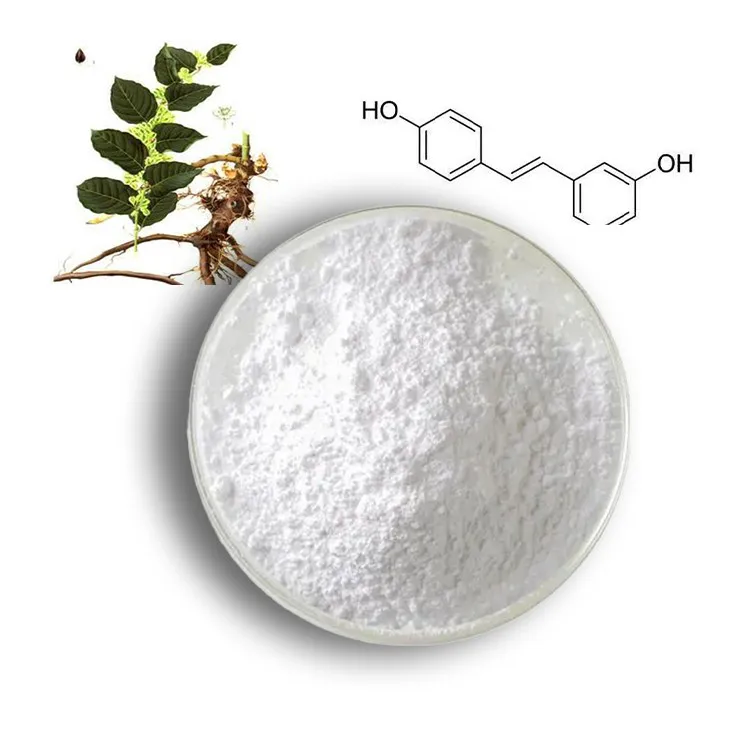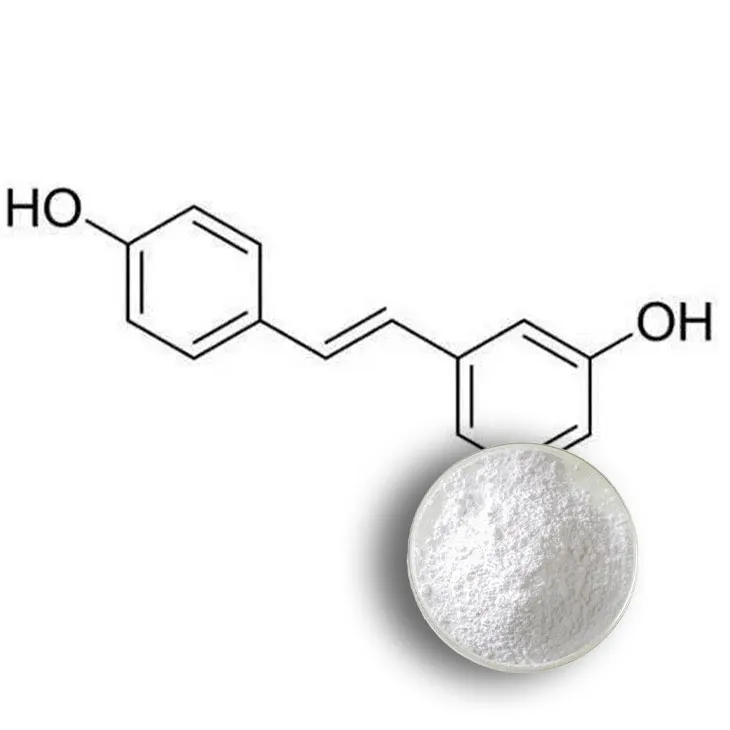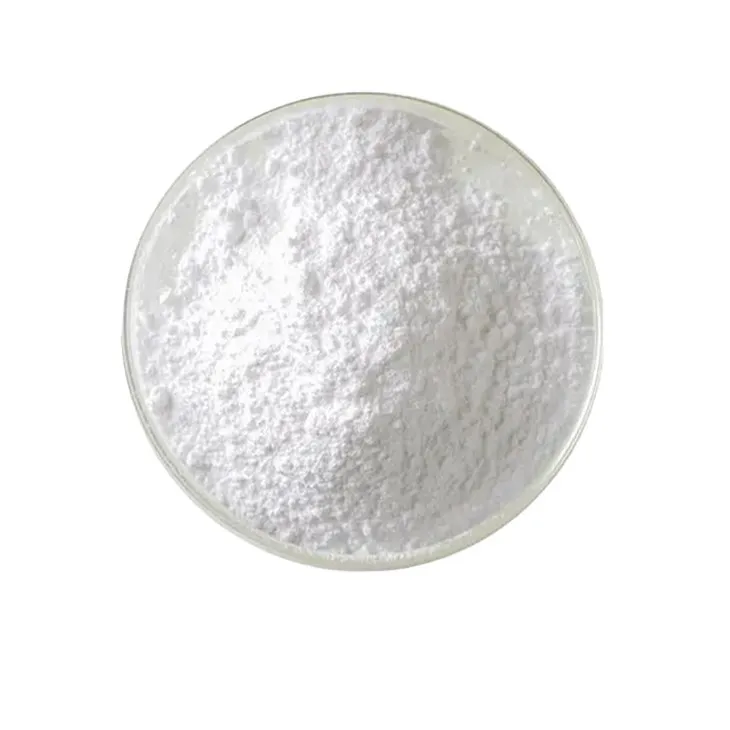- 0086-571-85302990
- sales@greenskybio.com
Benefits of Resveratrol Extract: An Impressive Extract on the Kitchen Table.
2024-11-13

Introduction
White Resveratrol extract is truly a remarkable substance that has been garnering increasing attention in the world of health and nutrition. Originating from plants such as red grapes, it offers a plethora of benefits that make it a worthy addition to your daily routine. This extract has the potential to impact various aspects of our health, from the external appearance of our skin to the internal workings of our immune and nervous systems.

Antioxidant Properties
One of the most significant aspects of white Resveratrol extract is its role as a powerful antioxidant. Antioxidants are crucial in maintaining good health as they combat the harmful effects of free radicals in the body.
How it Works
Free radicals are unstable molecules that can cause damage to cells through a process known as oxidation. Resveratrol scavenges these free radicals, effectively neutralizing them and preventing them from causing further harm. This process is vital for overall health as oxidative stress, which is caused by an imbalance between free radicals and antioxidants in the body, has been linked to numerous health problems, including heart disease, cancer, and neurodegenerative disorders.
Benefits for Skin Health
The antioxidant properties of resveratrol are particularly beneficial for skin health. As we age, our skin is constantly exposed to environmental factors such as UV radiation, pollution, and stress, which can lead to the formation of free radicals. These free radicals can damage the skin cells, resulting in wrinkles, loss of elasticity, and a dull complexion.
- Reduction of Wrinkles: By neutralizing free radicals, resveratrol helps to prevent the breakdown of collagen and elastin in the skin. Collagen and elastin are proteins that are essential for maintaining the skin's firmness and elasticity. As a result, regular use of Resveratrol extract can help to reduce the appearance of wrinkles and fine lines.
- Improvement of Skin Elasticity: Resveratrol also promotes the production of new collagen and elastin in the skin. This not only helps to improve the skin's elasticity but also gives it a more youthful and radiant appearance.
- Protection Against UV Damage: In addition to its antioxidant properties, resveratrol has been shown to have some protective effects against UV radiation. While it is not a substitute for sunscreen, it can complement sun protection measures by reducing the damage caused by UV - induced free radicals.

Support for the Immune System
White resveratrol extract also plays an important role in supporting the immune system. A strong immune system is essential for the body to defend itself against infections, diseases, and other harmful invaders.
Immune - Boosting Mechanisms
Resveratrol has been shown to enhance the function of immune cells such as macrophages and T - cells. Macrophages are white blood cells that play a key role in the body's first line of defense by engulfing and destroying foreign substances. T - cells, on the other hand, are responsible for recognizing and attacking specific pathogens.
By improving the function of these immune cells, resveratrol helps the body to fend off infections more effectively. It also has anti - inflammatory properties, which can help to reduce inflammation in the body. Chronic inflammation has been linked to many diseases, including autoimmune disorders, so reducing inflammation is an important aspect of maintaining good health.
Seasonal and Chronic Infections
During the cold and flu season, a strong immune system can help to reduce the risk of getting sick. Resveratrol can be a valuable addition to your immune - boosting regimen, along with other healthy lifestyle practices such as a balanced diet, regular exercise, and adequate sleep.
For those with chronic infections or weakened immune systems, resveratrol may also offer some benefits. It can help to strengthen the immune response and potentially reduce the frequency and severity of infections.

Implications for Brain Health
The role of white resveratrol extract in brain health is another area of great interest. As we age, our brain function can decline, leading to problems such as memory loss, cognitive impairment, and an increased risk of neurodegenerative diseases such as Alzheimer's and Parkinson's.
Protection of Neurons
Resveratrol has been shown to protect neurons from damage. Neurons are the basic building blocks of the brain and nervous system, and any damage to them can have a significant impact on brain function. Resveratrol can prevent neuronal damage caused by oxidative stress, inflammation, and other factors.
Improvement of Cognitive Function
In addition to protecting neurons, resveratrol may also improve cognitive function. Studies have shown that it can enhance memory, learning, and concentration. This is likely due to its effects on the brain's neurotransmitters, which are chemicals that are responsible for transmitting signals between neurons.
For example, resveratrol has been shown to increase the levels of acetylcholine in the brain. Acetylcholine is a neurotransmitter that is important for memory and learning. By increasing its levels, resveratrol may help to improve cognitive function.
Potential in Neurodegenerative Diseases
Given its beneficial effects on brain health, resveratrol has also been studied for its potential in preventing and treating neurodegenerative diseases. While more research is needed, some studies have shown promising results.
In animal models of Alzheimer's disease, resveratrol has been shown to reduce the formation of amyloid plaques, which are one of the hallmarks of the disease. It has also been shown to improve cognitive function in these animals.
In Parkinson's disease, resveratrol may protect dopaminergic neurons, which are the neurons that are affected in this disease. By protecting these neurons, resveratrol may slow down the progression of the disease.

Other Potential Health Benefits
White resveratrol extract may also have other potential health benefits that are still being explored.
Heart Health
There is some evidence to suggest that resveratrol may be beneficial for heart health. It has been shown to have anti - platelet and anti - clotting properties, which can help to reduce the risk of heart attacks and strokes. Resveratrol may also improve blood vessel function by increasing the production of nitric oxide, which helps to relax blood vessels and improve blood flow.
Metabolic Health
Resveratrol may also play a role in metabolic health. It has been shown to improve insulin sensitivity, which can help to prevent type 2 diabetes. Resveratrol may also increase energy expenditure and fat burning, which could potentially be beneficial for weight management.
Anti - Cancer Properties
Some studies have suggested that resveratrol may have anti - cancer properties. It has been shown to inhibit the growth and proliferation of cancer cells in vitro and in animal models. However, more research is needed to determine whether resveratrol can be used as a treatment for cancer in humans.
How to Incorporate White Resveratrol Extract into Your Diet
Given the numerous potential benefits of white resveratrol extract, you may be wondering how to incorporate it into your diet.
Food Sources
As mentioned earlier, resveratrol is found in plants such as red grapes. Other food sources include blueberries, cranberries, peanuts, and some types of berries. However, the amount of resveratrol in these foods may vary, and it may be difficult to obtain a sufficient amount through diet alone.
Supplements
One option is to take resveratrol supplements. These are available in various forms, including capsules, tablets, and powders. When choosing a supplement, it is important to look for a high - quality product from a reputable manufacturer. It is also advisable to consult your healthcare provider before starting any new supplement, especially if you have any underlying health conditions or are taking medications.
Cooking with Resveratrol - Rich Foods
Another way to incorporate resveratrol into your diet is by cooking with resveratrol - rich foods. For example, you can make a red grape salad, add blueberries to your morning oatmeal, or use peanut butter in your sandwiches. By including these foods in your diet, you can increase your intake of resveratrol in a natural and delicious way.
Conclusion
White resveratrol extract is a truly remarkable substance with a wide range of potential health benefits. From its antioxidant properties that benefit skin health to its role in supporting the immune system and promoting brain health, resveratrol has a lot to offer. While more research is needed to fully understand all of its effects, it is clear that this extract is a promising addition to a healthy lifestyle. Whether through diet or supplementation, incorporating resveratrol into your daily routine may be a step towards better health and well - being.
FAQ:
What is resveratrol extract?
Resveratrol extract is a substance that comes from plants such as red grapes. It has many health - promoting properties.
How does resveratrol extract benefit skin health?
Resveratrol extract is a powerful antioxidant. It scavenges harmful free radicals in the body, which can reduce wrinkles and improve skin elasticity, thus benefiting skin health.
Can resveratrol extract support the immune system?
Yes, it may support the immune system. By doing so, it helps the body fend off infections.
What are the implications of resveratrol extract for brain health?
Resveratrol extract may protect neurons from damage and potentially improve cognitive function. This is important for maintaining mental sharpness as we age.
Why is resveratrol extract considered worthy of being on the kitchen table?
Because it has a wide range of health - promoting properties, such as antioxidant activity for skin health, support for the immune system, and implications for brain health, so it is worthy of being on the kitchen table.
Related literature
- Title: Resveratrol: A Review of its Antioxidant and Anti - Inflammatory Effects"
- Title: "The Role of Resveratrol in Brain Health and Disease"
- Title: "Resveratrol and Skin Aging: A Comprehensive Review"
- ▶ Hesperidin
- ▶ Citrus Bioflavonoids
- ▶ Plant Extract
- ▶ lycopene
- ▶ Diosmin
- ▶ Grape seed extract
- ▶ Sea buckthorn Juice Powder
- ▶ Fruit Juice Powder
- ▶ Hops Extract
- ▶ Artichoke Extract
- ▶ Mushroom extract
- ▶ Astaxanthin
- ▶ Green Tea Extract
- ▶ Curcumin
- ▶ Horse Chestnut Extract
- ▶ Other Product
- ▶ Boswellia Serrata Extract
- ▶ Resveratrol
- ▶ Marigold Extract
- ▶ Grape Leaf Extract
- ▶ New Product
- ▶ Aminolevulinic acid
- ▶ Cranberry Extract
- ▶ Red Yeast Rice
- ▶ Red Wine Extract
-
Natural grape seed extract
2024-11-13
-
Licorice Root Extract Powder
2024-11-13
-
Giant Knotweed Extract
2024-11-13
-
Quercetin
2024-11-13
-
White Willow Bark Extract
2024-11-13
-
Medicinal Marshmallow Extract
2024-11-13
-
Plantain extract
2024-11-13
-
Eucommia Ulmoides Extract
2024-11-13
-
Propolis Extract Powder
2024-11-13
-
Centella Asiatica Extract
2024-11-13





















